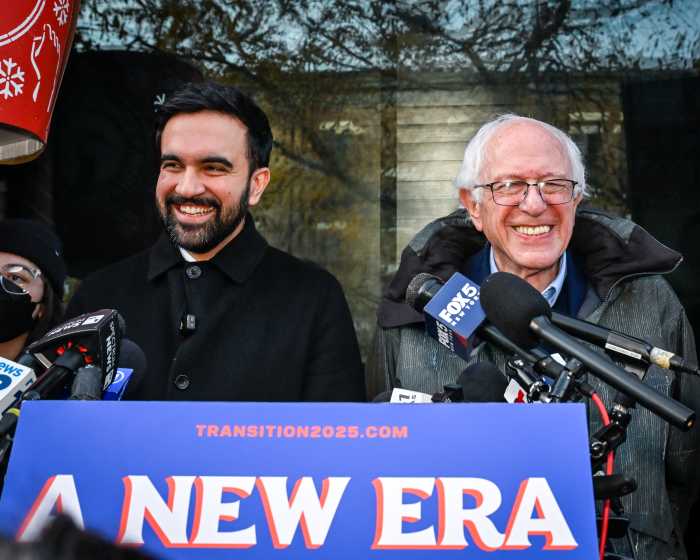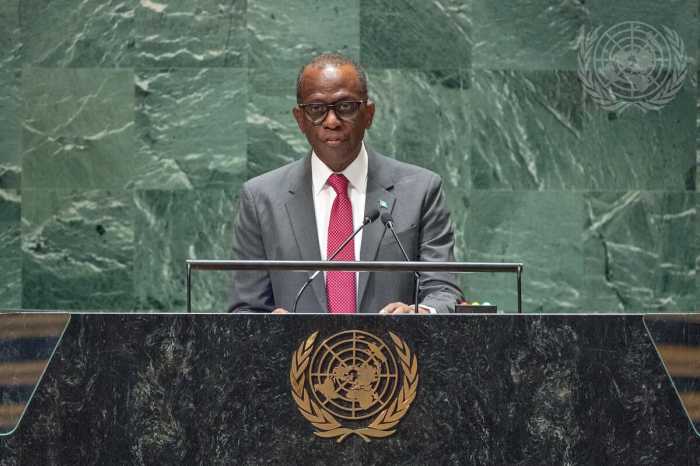Mayor Bill de Blasio. | GAY CITY NEWS
Ruling in a long-running case that may not yet be at an end, a federal appeals panel has found that a New York City policy barring the rental of public school space for “religious worship services” does not violate the First Amendment.
The April 3 decision from the Manhattan-based Second Circuit Court of Appeals involved a policy most recently promulgated in 2007 by the city’s Board of Education (since reorganized as the Department of Education). The suit was filed by the Bronx Household of Faith, a religious congregation whose application to hold worship services at a public school in that borough was denied after this policy was adopted.
The congregation, by that time, had already been in court for a decade in response to prior Board of Education efforts to prevent religious services from taking place in city public schools. Judge Pierre Leval’s opinion cites four prior opinions by the Second Circuit, all titled Bronx Household of Faith v. Board of Education, dating back as far as 1997.
The 2007 policy provided that outside organizations and individuals may receive permits for use of school buildings outside of school hours but not if their purpose is to hold “religious worship services.”
In the litigation involving the 2007 policy, District Judge Loretta Preska originally ruled the policy violated the church’s First Amendment free speech rights. A content-based regulation or prohibition of speech can only be upheld if the government has a compelling interest in limiting the speech, usually to avoid serious public disorder, and Preska held that this standard had not been met. That ruling did not turn on the religious nature of the case.
The Second Circuit disagreed with Preska and sent the case back to her for further consideration. In her more recent ruling, she accepted the congregation’s argument that excluding religious worship services violated its First Amendment right to free exercise of religion.
Essentially, the congregation argues that in opening up the schools to use by private, non-government groups outside of school hours, the city created a public forum in which it may not discriminate against religious uses. But, the appeals panel majority pointed out that the schools’ exclusionary policy is rather narrow and does not bar all religious uses. For example, the church could receive a permit to hold a Bible-study group or a religious discussion group in a school building –– not to mention to carry out social service work. The only limitation, quite narrowly, is to deny use of premises for an actual worship service.
According to news reports, many small congregations around the city that cannot afford to rent facilities large enough for worship services have sought to use school auditoriums, some of them attracting hundreds of people to such services on a regular basis, hanging banners and other material that, in effect, convert the space into a religious sanctuary during the service.
In her most recent ruling, Preska accepted the church’s argument that the ban violated the Free Exercise Clause because the schools are “the only location in which [Bronx Household's congregation] can afford to gather as a full congregation [for Sunday worship services] without having to curtail other of their religion’s practices.”
The appeals court rejected this rationale.
“The Free Exercise Clause has never been understood to require government to finance a subject’s exercise of religion,” Judge Leval wrote, citing Supreme Court and lower court decisions reinforcing the point.
The panel majority viewed the provision of school facilities for religious worship services at little or no charge a subsidy for the church, especially in light of the cost of renting large spaces in New York City.
In dissent, Judge John Walker pointed to a 1993 Supreme Court decision that struck down a Hialeah, Florida, ordinance prohibiting a ritual chicken slaughter practice of a Christian sect, finding that it was a form of discrimination against religion. Walker argued that singling out religious worship services for prohibition on school grounds was, similarly, a form of discrimination against religion.
The majority rejected this contention, finding that Preska’s ruling was “based on a misunderstanding of” the 1993 decision and that “a reasonable government decision not to subsidize a category of activity is not a suspect discrimination among religions merely because some religions do and others do not engage in that activity.”
In the 1993 case, the city of Hialeah outlawed a specific religious practice. By contrast, the New York schools were not outlawing anything. The churches are free to carry on their religious worship services, just not in school buildings paid for by the taxpayers. According to the court, the Board of Education had expressed fear that allowing the services to be held in school buildings might violate the Establishment Clause, which forbids the government from endorsing or preferring a particular religion. And the court rejected the church’s argument that because school authorities would have to make decisions whether particular activities proposed at a school constituted “religious worship services,” the ban required “entanglement” between church and state –– which the First Amendment is intended to prevent. The panel’s majority concluded such entanglement would be minimal.
The court noted it was not deciding the question of whether allowing religious services on school property violates the Establishment Clause, but rather that the Board of Education could reasonably have feared such a violation and wanted to avoid the possibility. Some opponents of allowing church services on school property were disappointed the court didn’t draw its own conclusions regarding the constitutionality of the underlying issue, but courts typically avoid taking on constitutional questions if deciding a case does not require it.
The court majority relied heavily on a 2004 Supreme Court decision that rejected a free exercise challenge to the State of Washington’s graduate scholarship policy barring such support from being used to fund education for religious ministry. A scholarship recipient could use scholarship money to pursue graduate study in the history of religion but not to pursue a theology degree. The state was not banning education in theology, certainly, but was taking the position that it shouldn’t pay to educate people to be ministers (something commonly done in Britain at the time the new American nation adopted the First Amendment).
The Washington State policy, the high court concluded, “imposes neither criminal nor civil sanctions on any type of religious service or rite. It does not deny to ministers the right to participate in the political affairs of the community. And it does not require students to choose between their religious beliefs and receiving a government benefit. The State has merely chosen not to fund a distinct category of instruction.”
The Second Circuit panel similarly saw the New York schools case as one essentially about funding. Can the schools decide that they do not want to provide financial assistance by allowing their property to be converted to religious worship service use? In light of the 2004 decision in the Washington State case, the Second Circuit panel majority did not see this as a difficult question. Both cases reflect the “historical and constitutional aversion to the use of public funds to support the practice of religion,” the panel found. The city’s interest “in respecting the principle of the Establishment Clause that disfavors public funding of religion is substantial, and the burden, if it can properly be called a burden, that falls on Bronx Household in needing to find a location that is not subsidized by the City for the conduct of its religious worship services, is minor from a constitutional point of view.”
Still, the burden on Bronx Household of Faith, from a real estate perspective, is not minor, which may help explain Judge Walker’s dissent. He argued that allowing the congregation to use public school space available generally to community groups “is hardly financing of that entity” and that “shutting the door to religious worship services in such a setting when every other activity is permitted strikes at the [Free Exercise] Clause’s core.” He argued that the policy “plainly discriminates against religious belief and cannot be justified by a compelling government interest.”
Walker suggested the underlying issues are “ripe for Supreme Court review.”
All indications are that Mayor Bill de Blasio, who has long voiced support for allowing churches to use otherwise empty school buildings on Sundays, will claw back the policy about which the city just won an appellate victory, rendering moot the current legal controversy.
If he does that, however, the Establishment Clause question would remain, and taxpayers objecting to the use of buildings paid for with public funds for religious worship services might set off new litigation, requiring an answer to the question the Second Circuit panel dodged answering in the case just decided.


















